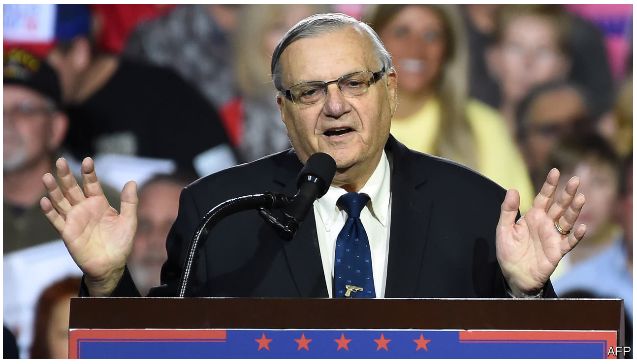https://www.economist.com/blogs/economist-explains/2018/04/economist-explains-8
He or she is accountable only to local voters, the constitution and God
JOE ARPAIO served 24 years as the sheriff of Maricopa (马里科帕,美国一个地区) county, Arizona, before losing his bid for re-election in 2016. Deeply controversial for his policies on ethnic profiling and jail conditions, Arpaio was repeatedly admonished (告诫) by state and federal courts, culminating (达到顶点) in a conviction for criminal contempt of court in 2017. He was soon pardoned by President Donald Trump. Arpaio (pictured above, at a Trump rally), who is 85, is currently vying (争夺,vie的现在分词) for the Republican nomination for the Arizona senate seat up for grabs this year. Both he and Richard Mack, founder of the Constitutional Sheriffs and Peace Officers Association, are held up by right-wing anti-federalists as avatars of the power of the sheriff, a unique position in American policing and governance that has come to represent to some a last bulwark against federal authority. Why is the job of sheriff such a polarising (极化) position in America?
The word sheriff comes from “shire reeve”, meaning a county’s chosen protector, dating back to pre-Norman Conquest times in England. After the conquest, the sheriff's role shifted to become a kind of investigator, lesser judge, and jailer for those awaiting trial. Even that role dwindled (减少;变小) across centuries, especially after the emergence of the modern police force. The post was taken to some British colonies, however, and, as more white settlers arrived, sheriffs saw their role grow. They were often the primary form of law enforcement in parts of the country that had few settlements and little or no policing. The sheriff came to symbolise order in the absence of other authority, and decades of film and TV westerns reinforced that view. Sheriffs are often responsible for rural areas and the people who respect their position most are frequently those who reject federal officers’ powers. Nearly all of America’s 3,100 or so sheriffs attain office through direct election and have no direct executive oversight. Their only accountability is to the county’s voters. They swear an oath to uphold the constitution and other laws, but each state defines the role differently. In some, a sheriff's office functions like a police department for a county; others may simply do things like manage county jails or transport prisoners.
It is this independence, lack of federal oversight and perceived closeness to the constitution that have elevated the sheriff in the eyes of right-wing activists who believe the federal government has no legitimate authority to enforce most federal laws, especially those related to taxes, guns, and land use. William Porter Gale, a white-supremacist preacher, began promulgating this paramount-sheriff notion in the 1960s with a movement called Posse Comitatus, named for a now-obscure power of sheriffs to conscript the "power of the county” to seize miscreants and escaped slaves. Gale’s work led in a nearly direct line to modern white-supremacist groups, and the militia movement that spawned the deadly bombing of a federal building in Oklahoma City in 1995. More recently, an outgrowth known as “sovereign citizens” believe they have individual power equal to that of government. They are responsible for several murders of police and sheriff deputies at routine traffic stops. The FBI, terrorism experts and other law-enforcement bodies view so-called sovereign citizens as the pre-eminent threat posed by domestic terrorism.
While Mr Arpaio, Mr Mack and others disavow (否认) violence while maintaining their view of the sheriff as ultimate constitutional arbiter, they do not discount it. “The potential for violence is always there. But I pray it won’t come to that. We don’t want that,” Mr Mack said in an interview in 2012 with theDenver Post. His group says hundreds of sheriffs share their views. Though hardly mainstream, distrust of the federal government is not restricted to the fringe. The police chief of West Memphis, Arkansas, whose son, also a police officer, was shot and killed by a believer in sovereign citizenship, told the Center for Public Integrity: "Even I agree with a lot of what they say. But law enforcement is not the enemy.”
